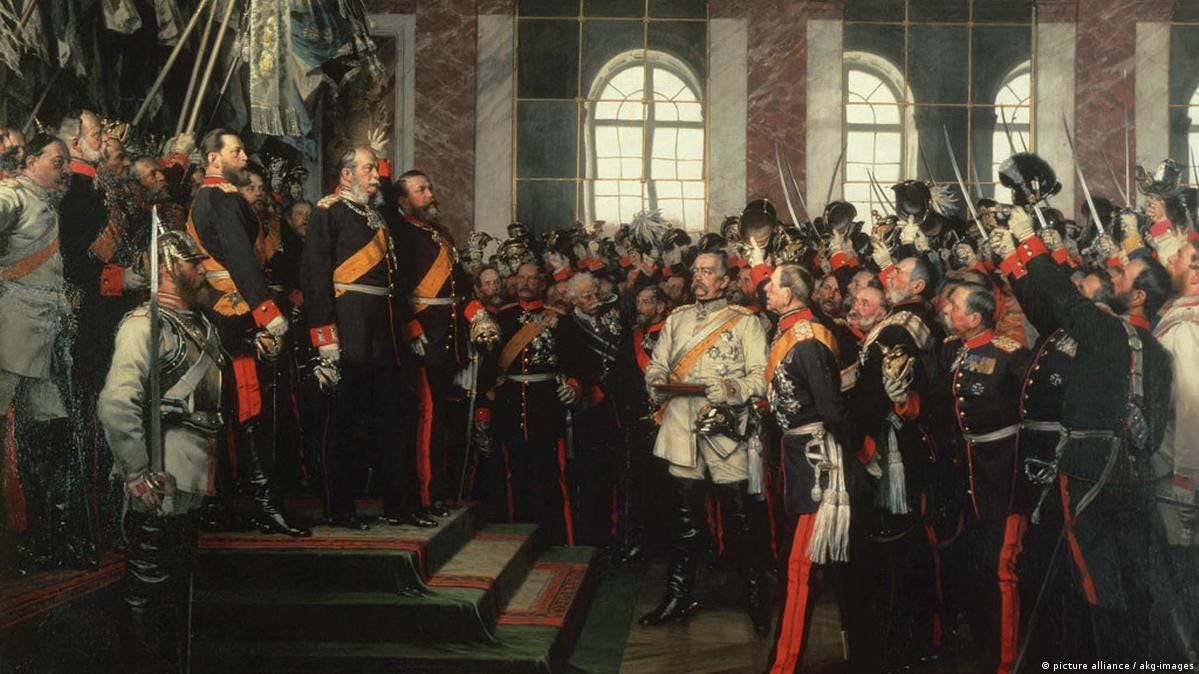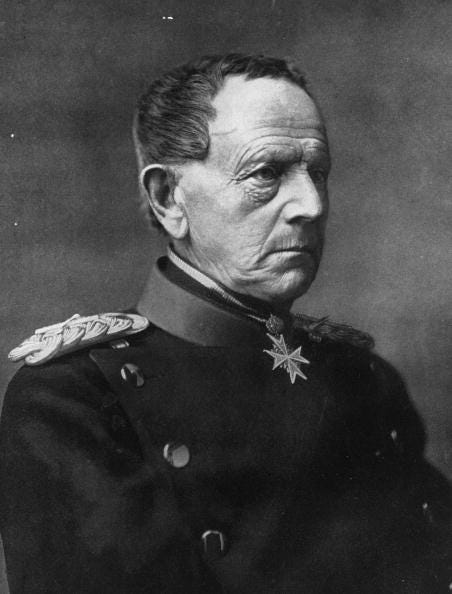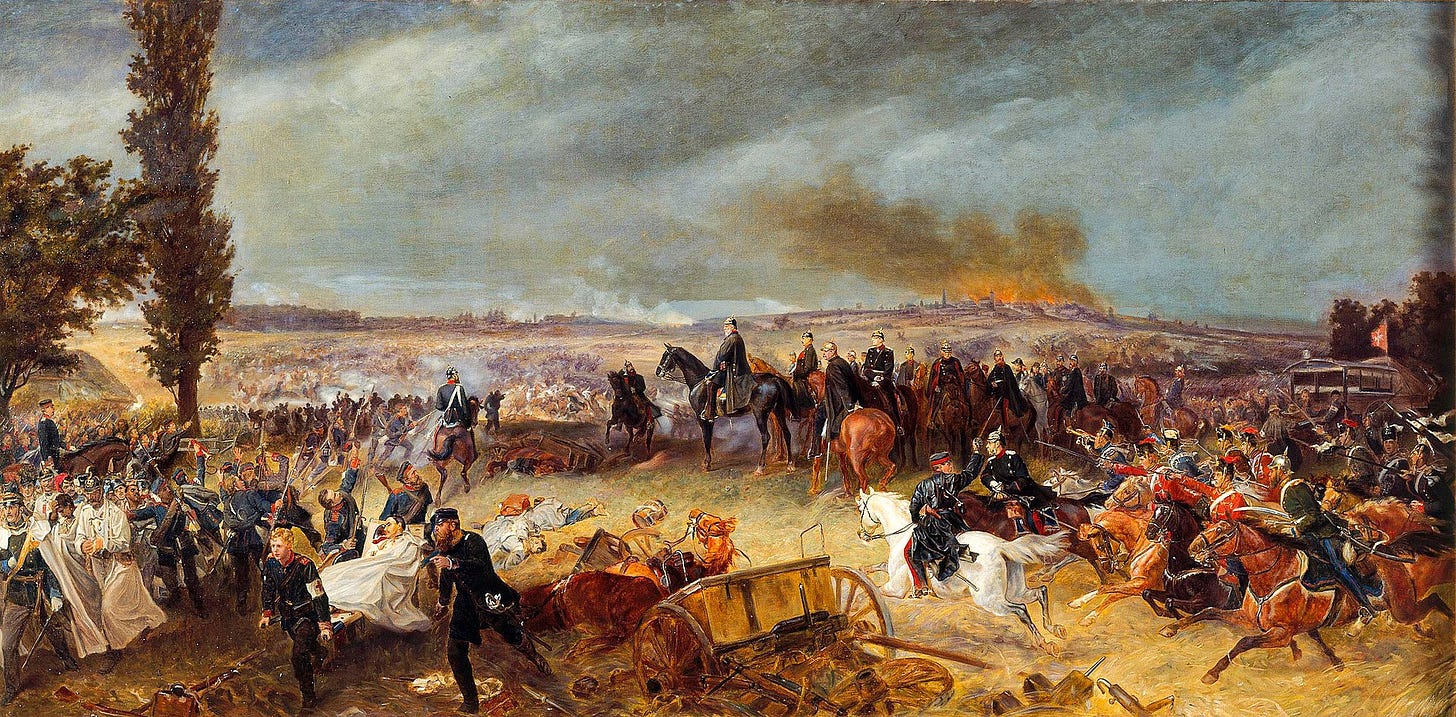How One Man United the German Empire - And Doomed It
Civil-Military Relations and the Theory of War
Chancellor Otto von Bismarck is rightly regarded as the architect of German unification. His understanding of the balance of power allowed the kingdom of Prussia to unify the German states under its leadership. However, this article is not about the “Iron Chancellor.”
Instead, we will look at a man less renowned nowadays, but no less essential to German unification, Chief of the General Staff, Helmuth von Moltke the Elder. Moltke was born to a German family in service to the crown of Denmark in 1800, his childhood marred by the Napoleonic wars. At age 21 he left a commission in the Danish army to join the Prussian Army. Marked intellectual, he quickly found favor at court. When Prussia entered the Second-Schleswig War in 1864, he had advanced to Chief of the General Staff.
The war of Austria and Prussia against the Danes was a lopsided affair. Moltke’s first true test was therefore during the Austro-Prussian War of 1866. Superior mobilization methods and innovative use of railroads to operate on exterior lines allowed Prussia to concentrate disparate forces on the battlefield at Königgrätz and smash the Austrian army. Despite the grand victory, the Austria army was not annihilated, but survived its defeat. Moltke, seeing the weakness of the Austrians, desired to continue the war until Austria could be utterly defeated. In his view, it was the responsibility of the army to render the enemy helpless so that the politicians could enforce whatever terms they desired. Bismarck desired immediate peace; further humiliating the Austrians would have created lasting enmity and prolonging the war risked the intervention of third parties.
“If we are not excessive in our demands and do not believe we have conquered the world, we will attain a peace that is worth our effort. But we are just as quickly intoxicated as we are plunged into dejection, and I have the thankless task of pouring water into the bubbling wine and making it clear that we do not live alone in Europe, but with three other powers that hate and envy us.” -Otto von Bismarck
In the case of Austria, Bismarck was successful in appealing to the King’s distaste for war with another German state to make peace. Through this he succeeded in avoiding the hatred of Austria while Prussia eclipsed it as the preeminent German state. However, when war came again in 1870, this time with France, Moltke and the General Staff were intent on preventing the Chancellor from interfering. Bismarck was prohibited from attending the council of war on the grounds that he was a civilian. Prussia’s most senior politician was in the humiliating position of receiving updates on the war through the popular press. While Bismarck favored making peace swiftly as he had done in the war against Austria, the army had begun the siege of Paris before he had been able to prevail upon the king to intervene in his favor. With the capital besieged and the French Emperor in Prussian captivity, any chance of swift peace that avoided enmity evaporated. Bismarck instead committed to as punitive a peace as possible with the aim of keeping France weak for as long as possible.
In this way, Moltke’s opportunity to wage the war in France in the manner of his choosing had profound political consequences. In the effort to escape from the interference of politicians, the Germany army took political decision making power out of the hands of the Chancellor. The professional officers had no desire to operate at the political level and so did not acknowledge this. As Moltke wrote in 1871, “Policy uses war for the attainment of its goals; it works decisively at the beginning and the end of war, so that indeed policy reserves for itself the right to increase its demands or to be satisfied with a lesser success. In this uncertainty, strategy must always direct its endeavors towards the highest aim attainable with available means.” Nowhere in this formulation are the political consequences of seeking the “highest aim attainable” with military means.
Ultimately, Moltke’s views on the correct relationship between the army and civilian leadership were taken as the lesson of the wars of unification. The veneration of Moltke obscured the fact that Prussian ascendancy was attained through Bismarck’s capacity to enforce political priorities on the army. Moltke’s desired independence from the Chancellor was never realized. The German army as a result erroneously believed Moltke’s beliefs to be an element of the great victories he had won.
What was more, the conditions that built the German Empire were far from durable. With the figures of Moltke, Bismarck, and King Wilhelm, the primacy of policy was maintained. However, the Chancellor did not have actual authority over the army, Bismarck instead held sway via his influence with the King. The fact this arrangement was not institutional had dire consequences when different individuals assumed these offices. Succeeding Chancellors never enjoyed the favor and attending power that Bismarck had. Wilhelm II also proved averse to deferring to the Chancellor in the manner his grandfather had.
As a result in the years following German unification, the army increasingly came to internalize Moltke’s illusory concept of an army that conducted war without the “interference” of political leadership. Despite the extensive citation of Clausewitz, the German army ultimately failed to reckon with his central thesis: that war is an act of policy. From this, it is correct that political interests, as expressed by the civilian leadership, have primacy over strictly military concerns. The rejection of Clausewitz by Moltke and his successors meant that the army hobbled itself on the strategic-political level in the name of parochialism. The army had its independence, but at the price of general paralysis on all issues that required cooperation with the civilian government.
“...The only sound expedient is to make the commander-in-chief a member of the cabinet, so that the cabinet can share in the major aspects of his activities.”
-Carl von Clausewitz, On War
It was this that ultimately doomed the German Empire. In the years following the departure of Bismarck and Moltke, the army refused true cooperation with the Chancellor, Parliament, or War Ministry. By the tenure of Alfred von Schlieffen as Chief of General Staff, it was unwilling to request the expansion of the army it considered essential for its war plans. There was no institutional mechanism that informed civilian leadership of the war plans developed, instead it was left to the discretion of the army. As Germany became diplomatically isolated, the army came to develop increasingly desperate and doubtful war plans. The attitude of the army was that it was to seek victory within its purely military field. Institutional pride and a flawed understanding of the relationship between war and politics led to them refusing to share their grim conclusions about Germany’s strategic situation with civilian leadership.
Had the army coordinated openly and frankly with civilian leadership, it may have been able to attain more resources for preparing for war or, more importantly, made leadership aware of the precarity of Germany’s diplomatic position. Facing an alliance of Russia, France and Britain with Austria-Hungary as one’s primary ally was a prospect with long odds. This was apparent to the army. But it obfuscated this fact. To admit that this diplomatic isolation was not solvable through military means would have threatened their prestige. Instead, they said an early war was better than a late one, due to the pace of Russian industrialization. What was left unsaid was how doubtful success in an early war was.
German civilian leadership felt secure in the assurances of their army that not only could a war be won, but it was better sooner than later. With this attitude they did not hesitate to provoke or enflame crises. It was only after the German army had failed to capture Paris and knock out France in 1914 that it became clear they had been throwing stones in a glass house.
The case of the elder Moltke is an illustration of the fact that civil-military relations are a key responsibility of the army chief. To focus on battlefield victories to the exclusion of cooperation with civilian counterparts leaves a country unable to operate at the strategic-political level. As Clausewitz tells us, war is a fundamentally political affair. Yet it is also a profession, and it is therefore unsurprising that professional soldiers resent the direction of civilians. Professionals rarely welcome the intrusion of non-professionals into their sphere. The case of imperial Germany demonstrates what happens when an army indulgences in this tendency and seeks to separate war from its political dimension.
A frank assessment from the army of Germany’s strategic situation would have promoted a policy of caution and emphasized the need for strategic realignment. What Germany needed, the army did not provide. Instead, it accepted the theoretical relationship between army and state that Moltke had bequeathed, increasing its own prestige and independence at the expense of national interest. This legacy of institutionalized parochialism meant that just as Moltke had won Germany its empire, he had created the conditions that led to its eventual annihilation.







As I understand it, the link between the armed forces and the rest of the state was the emperor, but Wilhelm II was neither capable to provide a sensible grand strategy of his own nor willing to listen to competent ministers like his predecessors, so he was dysfunctional in this role.
https://image.slidesharecdn.com/weimarconstitution-140828000449-phpapp02/95/weimar-constitution-7-638.jpg?cb=1409184350
Wilhelm II destroying Bismarck's alliance system and leading Germany, at the time on a seemingly unstoppable upwards trajectory in terms of scientific, industrial and cultural power, in a war with bad odds, must be one of the major grand strategy failures in modern times. He simply gambled away an excellent, idiot safe position. Germany only had one natural opponent in Europe (France) and even was connected to most other powers by royal family ties.